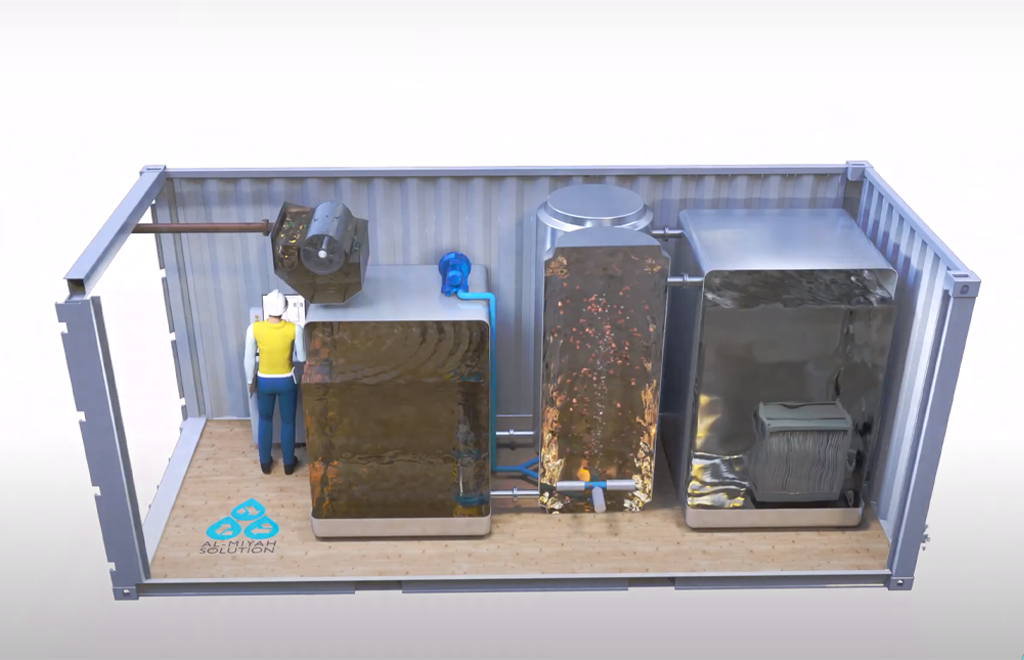Currently, 40% of Saudi households are not directly connected to a centralized wastewater treatment plant (WWTP). The sewage from those households is transferred via mobile tanker trucks to the closest WWTP. This issue creates congestion at the plants, with hundreds of trucks going in and out every day, resulting in lots of waste going untreated.
Untreated wastewater pollutes our environment, contaminates our water resources and damages our aquatic life. If we were to treat and recycle the world’s untreated wastewater, we’d have enough water to meet 25% of the global domestic water demand.
King Abdullah University of Science and Technology (KAUST) professor Pascal Saikaly recognized the urgent need for more widespread—and effective—wastewater treatment, especially in underserved areas of Saudi Arabia. With funding from KAUST Innovation, Saikaly and his team invented a portable wastewater treatment system that can be used commercially. The help from KAUST’s Technology Transfer Office, including grants from our impact-focused funding programs and our startup accelerator, TAQADAM — enabled Saikaly and team to develop a KAUST startup, Al-Miyah and commercialize this technology.
Saikaly couldn’t commercialize the technology without funding and resources
Wastewater treatment in Saudi Arabia is sporadic. In Dammam, 78% of wastewater treatment is centralized, whereas in some cities, like Najran and Al Baha, no households are connected to centralized wastewater treatment. Wastewater generated from houses that aren’t directly connected to a centralized wastewater treatment plant is collected by trucks and transported to centralized WWTPs.
Saikaly and his team developed a compact, containerized technology to decentralize water treatment for 40% of Saudi households that aren’t directly connected to a sewage system. The technology can treat up to 1,000 equivalent populations’ worth of water and can be placed on tanker trucks. This system eliminates trucks going back and forth between households and a centralized, large-scale WWTP. The technology is portable and compact, so it can be quickly manufactured and deployed to remote communities or other communities that aren’t connected to a central WWTP.
The benefits are twofold: more households will be able to have their water treated, and more water can be collected for reuse. Once Al-Miyah technology treats the water, it can be immediately recycled for local reuse in remote areas, residential housing compounds, hotels, hospitals and other communities. The treated water is suitable for non-potable applications such as landscaping, horticulture, toilet flushing, floor washing and more.
Saikaly needed funding to continue to de-risk his invention. He also needed other resources like expertise from industries like irrigation and agriculture to use the technology more widely.
KAUST supported Saikaly with resources to commercialize his wastewater treatment solution
KAUST supported Saikaly’s mission with funding, industry consultants, use of the Water Desalination and Reuse Center (WDRC) and taking part in a pilot project to help with irrigation initiatives. As a result, Saikaly and his team moved this technology from the research phase to the testing phase for real-world applications.

Saikaly’s expertise is in biological processes for wastewater treatment, but to expand the technology’s reach, he also needed support from experts to grow. The $1.7 million funding from KAUST’s Near Term Grand Challenge funding program allowed him to scale up Al-Miyah’s technology into a commercial demonstration significantly. Without it, he wouldn’t have been able to scale his invention to start testing it more widely.
Saikaly and team were able to conduct small-scale testing at a KAUST facility using this funding. KAUST formed Impact Funding Programs for this purpose — to advance tech projects from research to testing to commercialization. The projects supported by the program have the potential to make an impact on the GCC and MENA region’s environment and economy.
Now, all domestic wastewater can be treated with Al-Miyah
Thanks to KAUST Innovation, Al-Miyah can decentralize wastewater treatment for all Saudis and residents of the Kingdom. With KAUST’s support, Al-Miyah is collaborating with Ghirass Agriculture, a startup company that provides nano-irrigation technology, to showcase how the treated water can be used for irrigation. Ghirass is located in the KAUST Research & Technology Park and is an ideal partner to expand Al-Miyah’s irrigation initiatives with the treated water in the agriculture industry.
Al-Miyah’s mission supports the Kingdom’s goal of treating more wastewater by 2035. Currently, “the government of Saudi Arabia aims to treat all wastewater by 2025” and set a target to “treat 6.8 million cubic meters of wastewater per day” by 2035. Al-Miyah can’t meet that goal alone, but with KAUST, we can bring Saudi Arabia closer to the goal than they were before.

